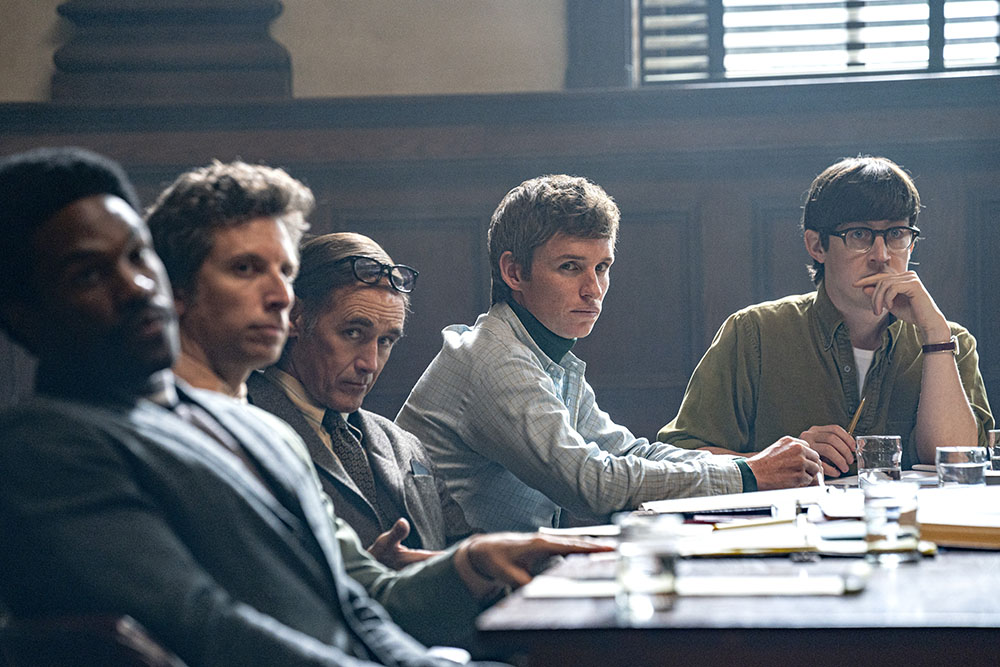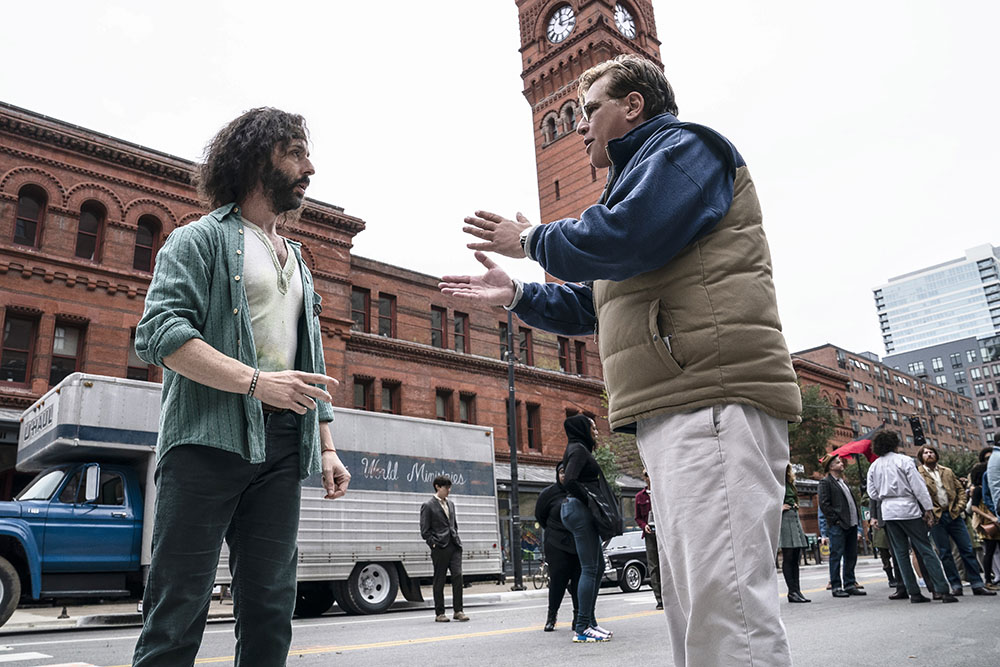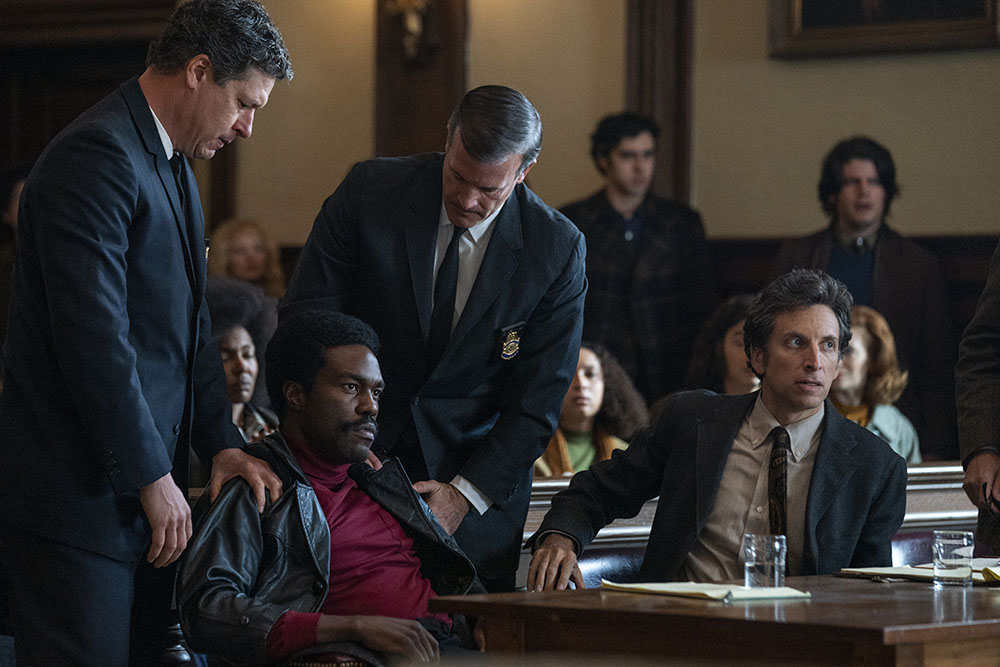
From left to right: Yahya Abdul-Mateen II as Bobby Seale, Ben Shenkman as Leonard Weinglass, Mark Rylance as William Kuntsler, Eddie Redmayne as Tom Hayden, and Alex Sharp as Rennie Davis in "The Trial of the Chicago 7." (Netflix/Nico Tavernise)
Two decades prior to Nike unveiling its iconic "Just do it" slogan in 1988, "Do it" was Jerry Rubin's (Jeremy Strong) generational call to action to 1960s anti-Vietnam War protesters. Before his 1994 death at 56 in a car accident, Rubin was a Los Angeles stockbroker, embodying the culture he once countered.
The Youth International Party (or Yippie) cofounder, the other Yippie leader Abbie Hoffman (Sacha Baron Cohen) and six others, as "The Trial of the Chicago 7" recalls, were tried in 1969 by the federal government for conspiracy to incite a riot during demonstrations at the Democratic National Convention in Chicago in August 1968.
Flat and too staid, the nonetheless timely period docudrama is available on Netflix.
Viewers will see ample parallels to our time. Throughout the summer, we witnessed protests and social upheaval, police militarization, their excessive force and employment of tear gas, particularly when cops cleared Lafayette Square near the White House for President Donald Trump's publicity stunt.
Trump's calls for law and order echo the 1968 era calls of Richard Nixon and Chicago Mayor Richard Daley, and his appeals to white supremacists mirror George Wallace's, who won five southern states in that year's presidential election.
The collaboration between the vaunted Dreamworks production company, the powerful streaming service Netflix and Emmy- and Academy Award-winning screenwriter Aaron Sorkin ("The West Wing") naturally elevates viewers' expectations.
In his second foray as a director, Sorkin occasionally uses some documentary footage, attempting to embellish his recreation of the trial and the events that precipitated it.

Jeremy Strong, who plays Jerry Rubin in "The Trial of the Chicago 7," with writer/director Aaron Sorkin in a production still from the film. (Netflix/Niko Tavernise)
"The Trial of the Chicago 7" opens upon newsreel footage of President Lyndon Johnson announcing a U.S. troop surge in Vietnam from 75,000 additional men to 125,000 new forces, which would increase the draft pool in 1968 from 17,000 to 35,000 draftees.
In that tumultuous year, the assassinations of the Rev. Martin Luther King Jr. in Memphis on April 4 and Bobby Kennedy in Los Angeles on June 5 also unsettled the nation.
Growing unease and anger about the war and fallout from the assassinations, in Sorkin's correct judgment, precipitated the skirmishes between police and protestors. In the wake of King's murder, Chicago erupted in unrest three months prior to the convention.
To control the disturbance, Daley, serving his fourth term as the city's mayor, urged his police superintendent James Conlisk to shoot to kill or maim or cripple arsonists and looters.
Mindful of the city's recent history, preparing for demonstrations and wanting to put his city and party's standard-bearer in the best possible light at a crucial moment, the Windy City's Catholic mayor ordered 10,500 city police and 6,700 Illinois National Guard troops to be deployed to secure the convention. Johnson additionally sent 5,000 army troops to reinforce them.
Advertisement
Walter Cronkite, in newsreel footage, expresses it succinctly: "A democratic convention is about to begin in a police state."
Sorkin employs a series of rapid, adroit crosscuts to introduce us to the trial defendants who came up against that police state. These snippets also reveal their divergent purposes and philosophies. Students for a Democratic Society (or SDS) leaders, disaffected Catholic Tom Hayden (Eddie Redmayne) and Rennie Davis (Alex Sharp) exhort college students to join them in Chicago.
(Growing up outside of Detroit, Hayden attended "radio priest" Fr. Charles Coughlin's parish, but the pastor's notorious anti-Semitism alienated him.)
It's important to be in Chicago, Hayden believes, to express their displeasure with the likely nominee, then Vice President Hubert Humphrey.
Pacifist David Dellinger (John Carroll Lynch), Black Panther Bobby Seale (Yahya Abdul-Mateen II), John Froines (Danny Flaherty) and Lee Weiner (Noah Robbins) were also on trial.
Sorkin has been developing this film for 13 years, and he gets some things right about 74-year-old Northern Illinois District Court Judge Julius Hoffman (Frank Langella), who presided over the travesty of the trial marked by his arbitrary and bizarre rulings and excessive contempt citations.

Yahya Abdul-Mateen II as Bobby Seale in "The Trial of the Chicago 7." (Netflix/Niko Tavernise)
Most egregiously, his refusal to allow Seale to postpone the trial when his attorney Charles Garry become ill or, in lieu of that, represent himself, led to the defendant's outbursts, which prompted the magistrate to bound and gag him. Hoffman eventually severed Seale's trial from the others, and he was granted a mistrial.
After five months, all were cleared of the conspiracy charges but five were guilty of inciting a riot, with all charges reversed on appeal in 1972.
But the director seems too close to his film to see what's wrong with it. It skips over the protests to the trial. As the narrative leaps forward, viewers who don't know the history will be lost. Limited flashbacks don't necessarily clarify our understanding and occasionally mislead.
In any historical drama, screenwriters typically take some liberties with what actually happened. But Sorkin's egregious omissions and what he gets wrong fundamentally mar "The Trial of the Chicago 7."
The film occasionally displays the outlandish antics and righteous outbursts, which characterized the accused's behavior during the trial. For instance, if tepidly, the filmmakers recreate Rubin and Hoffman showing up in court wearing judicial robes. For most part, however, the defendants sit passively, decorously by as they await their fate.
But it wasn't that way. They slept, read newspapers, ate, joked and conducted running commentary, with Rubin once doing a headstand on the defense table. He and others referred to the judge as Hitler and a Nazi while Hoffman regularly called his namesake Julie.
Far from being passive, the accused were cited close to 90 times for contempt. Sorkin fabricates a story about Dellinger punching a marshal, which a committed pacifist wouldn't do. According to a Feb. 15, 1970, New York Times account, when Dellinger said, "This court is in contempt of human life, dignity and justice," two marshals pushed him into his chair.
His 22-year-old daughter Natasha shouted, "Right on." Marshals rushed her, and she kicked one, setting off a brawl between the accused, their lawyers and spectators. "The Trial of the Chicago 7" would have worked much better if Sorkin showed us just how wild and colorful and vivid the trial was. Sorkin's deficient history doesn't add to our understanding of critical issues confronting us.
Through its fabricated, manipulative and unearned ending, "The Trial of the Chicago 7" massively disappoints.
[Chris Byrd frequently reviews books, films and TV shows for Catholic publications.]








